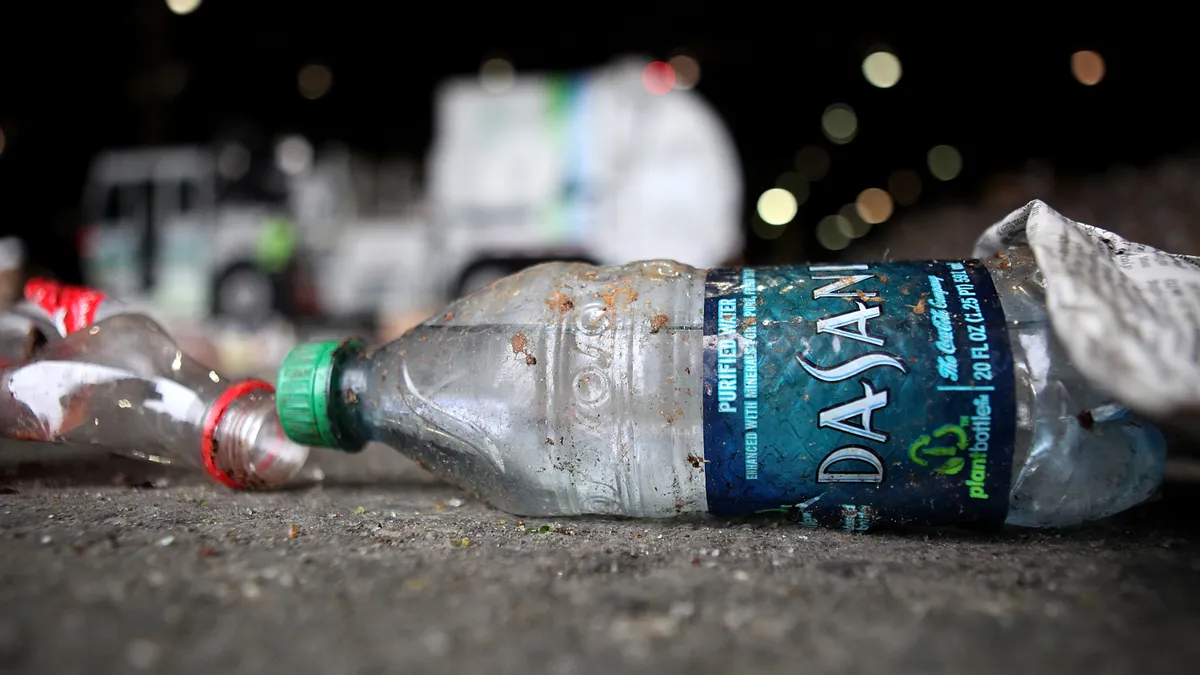This week, a roomful of sustainability coordinators, educators, government leaders, waste professionals, and various decision makers gathered to discuss one topic that will likely transform the state of all industries in years to come: the circular economy.
Hosted by the U.S. Chamber of Commerce Foundation (USCCF), the "Better Business, Better World" Sustainability Forum served as a springboard for leaders to brainstorm more sustainable and economically beneficial choices for their businesses. While the world turns away from a linear economy — when waste is an inevitable result of product development — a closed-loop system of reuse presents an opportunity for as much as $4.5 trillion in economic growth, according to consulting firm Accenture. However businesses must consider redesigning and reutilizing their products, and the main question is how to do that.
"The circular economy, as we think about it, is a massive business opportunity and if done well has the potential to have profound consequential benefits," said Andrew Morlet, CEO of The Ellen MacArthur Foundation and keynote speaker at the event. "It represents a mind shift in the way in which companies view markets and operate. It requires a more systemic approach, cross-functional collaboration within companies ... In short, it represents a new way of thinking and working."
Here are Waste Dive's five key takeaways from the Forum:
1. The circular economy is inevitable
There's no doubt that global economics are going to begin working in a circular way, as many companies are already implementing the ideals of a closed-loop system. As said by Jennifer Gerholdt, senior director of the environment program at the USCCF's Corporate Citizenship Center, "The linear model, which has been viable in delivering economic growth and development over the past 150 to 200 years, is no longer viable." In order to prepare for the future, companies are shifting away from this concept and beginning to pay attention to the true end-of-life of a product.
In Europe, the concept of a circular economy is already in play as the EU passed the "Circular Economy Package" in December 2015. However International Solid Waste Association (ISWA) President David Newman made it clear that Europe cannot function as an efficient circular economy on its own — all countries must get on board.
The reasons for the shift to a circular economy are evident. Waste management is being drastically shifted by many factors — population growth, climate change, uncertain commodity markets, shifting consumer attitudes — and without taking better control of the situation through a closed-loop system, these problems will only magnify.
The benefits, however, also create a key incentive for moving forward with the circular economy. While many leaders have cited the obvious perks of waste reduction and economic growth, other benefits include employment opportunities, new technologies, and innovation.
.@andrew_morlet closes out by saying the circular economy is "inevitable" — Now leaders need to take action and initiate it #USCCFCircular
— Kristin Musulin (@WasteDiva) May 16, 2016
2. The "system" must be kept in mind
Moving forward with a circular economy is not about changing one product or one method of recycling. It's also not about getting a few businesses on board or changing some consumer behaviors. It's about an entire system redesign — and doing it in a holistic fashion.
"You can have the corporate commitment, and you can have the consumer demand ... but I think what is missing is the system between us. How do we create a system that's easier than taking [waste] to a landfill?" asked Tim Conway, vice president of sustainability account development at Shaw Industries.
Rob Opsomer of The Ellen MacArthur Foundation cited a need for convergence in design, labeling systems, and collection systems in order to succeed. Other speakers highlighted the importance of remembering that every action has a reaction — an important concept that plays into product and packaging redesign.
"We need to redefine what waste is ... We can eliminate packaging for food tomorrow, but what happens? Food waste goes way up. Are you upset about the size of packaging when you order something through an e-commerce channel? ... That's another form of waste, but at the end of the day if you get something through e-commerce that's damaged, you care most about that." said Dr. Ronald Cotterman, vice president of sustainability at Sealed Air. "We have to keep it in perspective as a system approach that there are various things that happen."
3. Technology will be a key player
"Massive digital disruption" will be a factor of change in many different developments, especially economical shifts. Technology will have the ability to reduce demand in raw materials by allowing stakeholders to view the market in ways that couldn't be done before.
.@andrew_morlet explains how robots and technologies are going to alter the way we deal with waste #USCCFCircular pic.twitter.com/Of9FFSVser
— Kristin Musulin (@WasteDiva) May 16, 2016
Many technological developments were exemplified at the Forum, all offering a tool or product to help companies reach sustainability goals. Some of these technologies came in the form of software — such as Optoro, a reverse logistics solutions software for retailers, or Stuffstr, an app that promotes "post-sale product life cycle."
Technology was also displayed in the form of science. Eben Bayer, founder of Ecovative Design, demonstrated how his company is creating sustainable building and packaging materials, like foam and boards, to replace traditional materials that typically create an abundance of waste, like Styrofoam.
4. Consumer participation may present a challenge
While businesses will work hard to ensure that products are sustainable and offer a fuller lifecycle than traditional products, it will be a process to convince consumers to share the same focus on sustainability. This has already presented some challenges in various business sectors — for example, Dell's Executive Director of Product Compliance, Environmental Affairs and Producer Responsibility Michael Murphy noted some electronics consumers don't recycle their e-waste through sustainable e-waste return programs because they're not aware of the benefits, or they don't know that such programs exist.
Conway believes that consumers will change their behaviors out of fear or love, and it is the businesses' responsibility to ensure that methods of change are influenced by the latter. Consumers need to be educated and understand the reasoning for change before they make a personal push toward implementing it into their daily purchases.
"We can't change human behavior until we give people the opportunity to change the way they think"- Shaw Industries' T.Conway #USCCFCircular
— Kristin Musulin (@WasteDiva) May 16, 2016
Morlet believes that millennials will have the greatest consumer influence on the circular economy, as they represent the largest demographical segment of new consumers entering markets. He also believes that they have a greater awareness of environmental issues, and are therefore most likely to adapt to economical changes.
"I would argue that these customers are the ones that are going to shape your markets over the coming years," said Morlet.
5. Every industry can play a part
The Forum garnered representatives from higher education, corporate America, healthcare companies, technology startups, food and beverage giants, and other industries, all for one reason: the circular economy will affect everybody. Eventually, all companies will be forced to take a look at their waste streams and implement recycling, refurbishing, reuse, and redesign strategies to mitigate waste — or else they are bound to fall behind.
"It is clear that companies who move now will gain a competitive advantage, and those will be the ones that are leaders in this new economy as it emerges over the next several years," said Morlet.
And while a jump into the circular economy can be intimidating, leaders at the conference noted that there are four essential elements to success: awareness, innovation, transparency, and partnership. Many also noted that the race to the circular economy is a marathon, not a sprint.
"Start somewhere. Ignite the innovation within your organization," said Cotterman. "And start small, but don't be afraid to stop and try something else."











